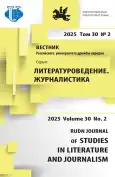The Dialectics of Faustian and Mephistophelean Principles in I.S. Turgenev’s Novella Faust
- Авторлар: Jingjing H.1
-
Мекемелер:
- St. Petersburg University
- Шығарылым: Том 30, № 2 (2025)
- Беттер: 231-241
- Бөлім: LITERARY CRITICISM
- URL: https://journal-vniispk.ru/2312-9220/article/view/319122
- DOI: https://doi.org/10.22363/2312-9220-2025-30-2-231-241
- EDN: https://elibrary.ru/HJZQXZ
- ID: 319122
Дәйексөз келтіру
Аннотация
Examines the image of Faust in the works of I.S. Turgenev, based on his eponymous novella (1856). The study demonstrates that Turgenev’s Faust is a complex and enriched figure, shaped by the interplay of European and Russian interpretations of this character, the writer’s personal life experiences, and the social reality of Russia in the first half of the 19th century. The protagonist-narrator is not a direct embodiment of Goethe’s Faust but rather a hybrid figure, blending traits of both Faust and Mephistopheles. Turgenev’s Faust is characterized by an antinomical fusion of contradictory qualities: a spirit of egoism and negation coexists within him alongside a pursuit of goodness, truth, and beauty. Through the protagonist, the writer fully explores the phenomenon of the reflective egoist, reinterpreting it through the lens of Christian moral ideals, as well as the pantheism of ancient and German thinkers. The author of the article concludes that Turgenev’s Faust emerges as the outcome of a tension between two principles - natural (divine) and human, theistic and pantheistic. This tension generates an internal conflict that can only be resolved by relinquishing individuality and the self. Service to duty is presented as the sole path to achieving unity with the universal.
Негізгі сөздер
Авторлар туралы
Hao Jingjing
St. Petersburg University
Хат алмасуға жауапты Автор.
Email: Haojingjing1983@foxmail.com
ORCID iD: 0009-0007-2660-0265
Student of the Department of the History of Russian Literature
7-9 Universitetskaya naberezhnaya, Saint Petersburg, 199034, Russian Federation.Әдебиет тізімі
- Aleksenko, S.A. (2010). Faustian motifs in the works of I.S. Turgenev in the 1850s. In E.F. Kirov, G. Kundrotas, & M.B. Loskutnikova (Eds.), Russian studies and comparative studies: a collection of scientific articles (Issue 5, pp. 155–164). Moscow: MPGU Publ. (In Russ.)
- Batyuto, A.I. (1972). Turgenev as a novelist. Leningrad: Nauka Publ. (In Russ.)
- Belyaeva, I.A. (2014). I.S. Turgenev’s Faust: Intertextuality in the light of the semantics of the epigraph. Spassky Vestnik, (22), 12–19. (In Russ.)
- Bityugova, I.A. (1980). Commentary: I.S. Turgenev. Faust. In I.S. Turgenev. Complete works and letters: in 30 vols (Vol. 5, pp. 412–430). Moscow: Nauka Publ. (In Russ.)
- Fedorov, F.P. (2006). Ivan Turgenev’s Faustiana. Filologicheskie Chteniya: 2005 (pp. 56–81). Daugavpils: Saule. (In Russ.)
- Pild, L. (2005). I.S. Turgenev’s story Faust (Semantics of the epigraph). In R. Lejbov (Compiler), The Tartu Notebooks (pp. 218–228). Moscow: Ob’edinennoe gumanitarnoe izdatel’stvo Publ. (In Russ.)
- Time, G.A. (1997). German literary and philosophical thought in the context of I.S. Turgenev’s work (genetic and typological aspects). Otto Verlag Sagner. (In Russ.)
- Trofimova, T.B. (2004). Turgenev and Dante (On setting the problem). Russkaya Literatura, (2), 169–182. (In Russ.)
- Turgenev, I.S. (1978). Complete works and letters: in 30 vols (Vol. 1). Moscow: Nauka Publ. (In Russ.)
- Turgenev, I.S. (1980). Complete works and letters: in 30 vols (Vol. 5). Moscow: Nauka Publ. (In Russ.)
Қосымша файлдар









